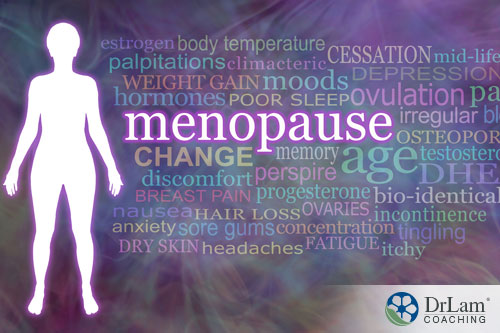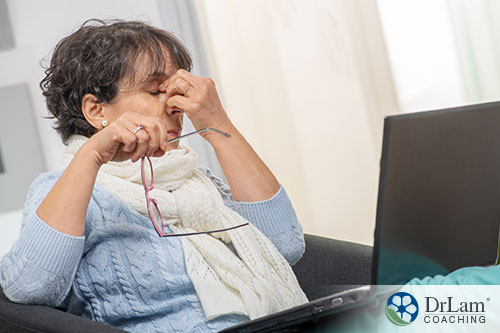 There are a few important hormonal milestones in a woman’s life, and menopause is one of the most impactful. The symptoms can be challenging to cope with, and not every woman gets the exact same symptoms or experiences this phase in the same way. In this article, we’ll cover some of the most common menopause symptoms as well as give you a few tips on steps you can take to find some relief.
There are a few important hormonal milestones in a woman’s life, and menopause is one of the most impactful. The symptoms can be challenging to cope with, and not every woman gets the exact same symptoms or experiences this phase in the same way. In this article, we’ll cover some of the most common menopause symptoms as well as give you a few tips on steps you can take to find some relief.
Different hormonal, genetic, and epigenetic factors play a role in the way your reproductive system ages and how you experience menopause. Although you can’t control your genes, you can certainly influence your hormones and leverage your lifestyle and diet to your epigenetic advantage.
The Hormone circuit of your NeuroEndoMetabolic (NEM) Stress Response is central to your reproductive health, and you’ll need to pay special attention to it when addressing menopause symptoms. This circuit is composed of your adrenal glands, your thyroid, and your ovaries, and all three components influence each other.
Your NEM Stress Response is composed of six circuits of organs and systems that work together to fight stress, whether physical or psychological. The other five circuits are the Bioenergetics, the Neuroaffect, the Cardionomic, the Inflammation, and the Detoxification circuits.
All six circuits impact your reproductive health and menopause, but since the Hormone circuit is the most important of the six when talking about women’s health, it’s the one we’ll focus on today.
To understand menopause, it helps to think of your reproductive system as an adaptive, continuously changing system that slowly progresses from one phase to another.
First is the reproductive phase, which begins with the start of menstruation and then reaches a peak of reproduction. The menopausal transition phase, which starts when the late reproductive stage is about to end, includes perimenopause, and ends with menopause itself. Afterward, you go into what’s called the postmenopausal phase.
The main hormones involved in female reproduction are estrogen, progesterone, follicle-stimulating hormone (FSH), luteinizing hormone (LH), anti-Mullerian hormone (AMH), and gonadotropin-releasing hormone (GnHR).
These hormones fluctuate day to day, phase to phase. And they fluctuate according to not just your biological rhythm, but your lifestyle and environment as well, such as what you eat, how you sleep, if you exercise, what supplements you take, any toxins you’re exposed to, and your stress levels.
Menopause is marked by a natural decline in estrogen and progesterone, and an increase in FSH. Once menopause is over and you enter the postmenopausal phase, all your reproductive hormones will level out and stay low.
The different changes in your hormones, from the daily fluctuations to the big transition milestones, are regulated by the control center in your brain: the hypothalamus and pituitary gland.
Starting with this control center in the brain, the signaling happens in a sort of hormone cascade, where the hypothalamus gets information from the rest of the body. For example, the information that certain hormone levels are low sends a signal to the pituitary gland to release some kind of stimulatory hormone. In the case of the reproductive system, that would be FSH. The FSH then stimulates follicular growth from the ovaries that prompts them to release eggs.
The hormone cascade that stimulates the adrenal glands to produce stress hormones is called the hypothalamic-pituitary-adrenal (HPA) axis, and the hormone cascade that stimulates the thyroid gland to produce thyroid hormones is called the hypothalamic-pituitary-thyroid (HPT) axis. The Hormone circuit links all three hormone cascades and involves what is called the Ovarian Adrenal Thyroid (OAT) axis.
Because of this link, trying to deal with menopause symptoms without addressing issues in the HPA, HPT, and OAT axes does not have long-lasting results. The entire Hormone circuit must be approached as a whole if you want to go through the different reproductive phases in a healthy way.
Different women will experience different menopause symptoms. But there are some that are more common than others, and their physiological causes are ones that you can sometimes affect in order to feel better. While some people do use hormone replacement therapy, we won’t cover that here in order to focus on more natural coping methods.
As you approach menopause, your periods will begin to change and then eventually stop. These changes can range from the timing, the duration, the heaviness, the pain levels, and the PMS symptoms that come with periods. You might find yourself having a very heavy period that lasts for 10 days in one month, and then a very short, light period that comes a few months later.
What’s behind these erratic cycles are changes in hormones. For example, FSH begins to steadily increase, while AMH and inhibin B (the glycoprotein that inhibits FSH production) decrease.
Though there’s not much you can do to stop the eventual ceasing of your menstruation, you can take steps to make it a more comfortable experience. The two things that affect it the most are diet and exercise.
The adrenal fatigue diet is one of the best diets for hormone balance, and it can also help your adrenal glands get stronger if you’re facing stress. The type of exercise that is most suitable will depend on your current state of health.
 Although fatigue is a natural reaction to all the changes your body is going through, severe tiredness can be a sign of other conditions that can often accompany menopause: Adrenal Fatigue Syndrome (AFS) or low thyroid function.
Although fatigue is a natural reaction to all the changes your body is going through, severe tiredness can be a sign of other conditions that can often accompany menopause: Adrenal Fatigue Syndrome (AFS) or low thyroid function.
Remember, the adrenal glands, the thyroid, and the ovaries are intricately linked through the OAT axis. If one is dysregulated, the others can also be affected.
The adrenal glands produce cortisol, your body’s main anti-stress hormone. That means that if your body is under stress, which is what happens during these transition phases, and it’s not getting the right kind of support, this stress can turn chronic and put a lot of pressure on your adrenals to produce more and more cortisol. This can eventually lead to AFS.
In the beginning stages of AFS, your cortisol levels rise above normal, which brings on symptoms. After a while, your adrenals can get exhausted and their cortisol output drops, bringing on even more severe symptoms.
Symptoms of AFS include fatigue, weight gain, hair loss, insomnia, anxiety, mild depression, PMS, loss of libido, infertility, dry skin, hypoglycemia, heart palpitations, food and drug sensitivities, lowered immunity, brain fog, salt and sugar cravings, and an inability to handle stress.
You’ll notice that a lot of these symptoms are similar to menopause symptoms, and that’s because they do affect each other, and their common root is a hormonal one. But the good news is that by working on one, you can improve the other.
With AFS, the adrenal fatigue diet is the cornerstone of recovery, along with managing stress levels, taking the right supplements, resting, sleeping, and doing very gentle forms of exercise until you’re stronger. Always get the advice of an experienced practitioner before starting any supplements.
Nothing says “hormonal” like mood swings, so it’s no surprise if you find yourself more irritated, depressed, anxious, and generally feeling more overwhelmed by emotional states.
But, like other menopause symptoms, you can get a lot of relief with some simple changes. Managing your stress levels, putting less on your to-do list, and getting some support are all very helpful. Therapy, coaching, meditation, and group support are also great options.
You also need to give yourself some grace and compassion, as you are going through a phase that can prove to be challenging. But trust that it will pass and that you will balance out soon.
Many women begin to experience pain and inflammation, such as joint pain, as their hormones begin to decrease. Also, this drop in hormones can lead to an increase in disease risk, since these hormones serve a protective function.
Add to that the fact that inflammation is an underlying cause of many chronic diseases, including autoimmune disorders, and you may begin to develop a few new issues here and there, or experience flare-ups of issues you already have. You may also begin to experience menopause symptoms related to inflammation, such as brain fog, headaches, skin problems, food sensitivities, and digestive issues.
That’s why it’s of utmost importance to pay attention to your diet and lifestyle, not just during menopause, but before it as well, so you can avoid inflammation as much as possible. Eating an anti-inflammatory diet is your best option, since most inflammation begins in the gut and then spreads to other parts of the body. This is especially important if you have AFS already, as more inflammation could be worsening your stress level and pushing you into later stages of AFS.
The dreaded hot flash is possibly one of the most recognizable and most irritating of all menopause symptoms. And although the exact cause of these sudden surges of warmth from the inside is still unclear, it seems to be linked with estrogen decline on an absolute basis, or estrogen dominance on an absolute or relative basis. Both scenarios can trigger vasomotor instability and hot flashes.
With estrogen, it’s not just the general decline, but also any sudden dips, which commonly occur at night, that can bring on these flashes of heat. That’s why many women experience hot flashes while sleeping and wake up drenched in sweat. Doing your best to stay hydrated, eating a hormone-balancing diet, and keeping your environment cool are some of the ways you can cope. Knowing whether your symptoms are are estrogen deficient or dominant is a key factor as the recovery pathways are very different. A detailed history by an experienced provider will help you find out, as laboratory tests are often inaccurate and can be misleading.
Other than the ceasing of menstruation and fertility, there are a few other menopause symptoms that can cause sexual and reproductive health problems, such as breast and vaginal pain. Again, the main causes for these changes are the decline in hormones, especially estrogen and progesterone.
You may find your breasts to be more sore, lumpy, and sensitive. Also, your breast cancer disease risk does increase, so you should make sure to stay on top of your check-ups including routine cancer screenings and maintaining a healthy lifestyle.
Your vagina and the lining of your urethra may begin to thin out and lose elasticity and lubrication. This can affect your experience of sex, making it more uncomfortable. You should use a lot of lubrication if that’s the case, and adjust the way you have sex if need be.
Libido might fluctuate, and you may be surprised by an increase in desire for sexual activity. But you may also experience periods of low libido, and accompanied with the discomfort that comes with a drier, thinner vagina, it might dampen your sex life a lot.
Don’t give up on it, though, as many women find this time to be their most liberating and enjoyable. So with a few tweaks here and there, this might become the sexiest time of your life.
 Menopause symptoms don’t have to spell the end of your vitality and sexuality; you just need to pay a bit more attention to your health and get the right kind of support in order to not only feel better, but to flourish in this new stage of your life. Here's how to get started:
Menopause symptoms don’t have to spell the end of your vitality and sexuality; you just need to pay a bit more attention to your health and get the right kind of support in order to not only feel better, but to flourish in this new stage of your life. Here's how to get started:
To get help dealing with menopause symptoms or problems, talk to our expert staff by clicking here or give us a call on +1 (626) 571-1234.
© Copyright 2020 Michael Lam, M.D. All Rights Reserved.
Although each woman is different, there are some common menopause symptoms with clear physiological causes and ways to deal with them. Understanding how your hormones work and what you can do to support their balance is the best way to find relief and even enjoy this phase of your life.
